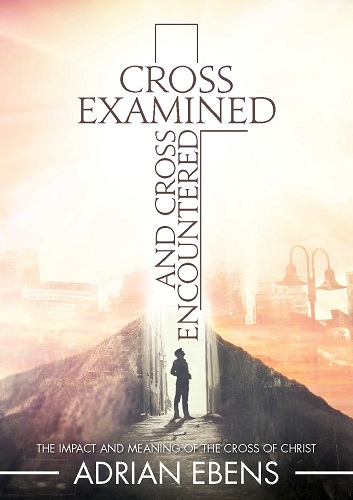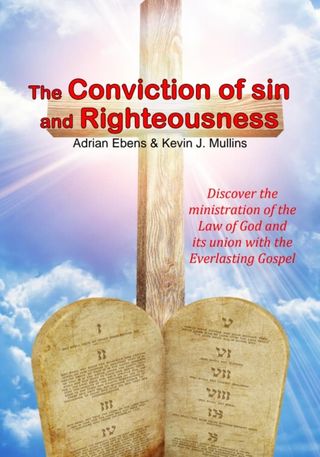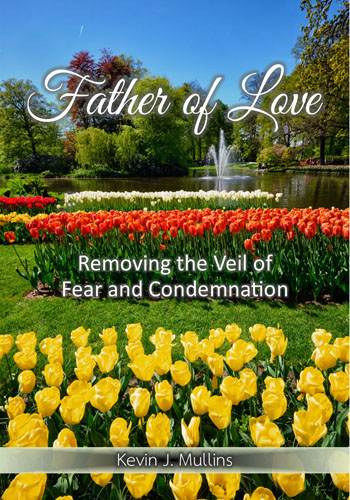(Acts 10:9-16) Did God Change His Dietary Instructions?
“ … Peter went up upon the housetop to pray about the sixth hour: And he became very hungry, and would have eaten: but while they made ready, he fell into a trance, And saw heaven opened, and a certain vessel descending unto him, as it had been a great sheet knit at the four corners, and let down to the earth: Wherein were all manner of fourfooted beasts of the earth, and wild beasts, and creeping things, and fowls of the air. And there came a voice to him, Rise, Peter; kill, and eat. But Peter said, Not so, Lord; for I have never eaten any thing that is common or unclean. And the voice spake unto him again the second time, What God hath cleansed, that call not thou common. This was done thrice: and the vessel was received up again into heaven.” (Acts 10:9-16)
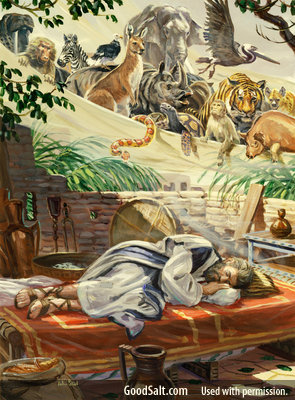 One such area in Scripture that many get confused is Acts chapter 10 where Peter, in vision, sees a sheet full of all sorts of creatures and God tells him to “Rise, Peter, kill, and eat.” Many teachers of today say that God is changing His Dietary Laws where He gave us instructions on what creatures were clean to eat and which ones were not (Leviticus 11; Deuteronomy 14).
One such area in Scripture that many get confused is Acts chapter 10 where Peter, in vision, sees a sheet full of all sorts of creatures and God tells him to “Rise, Peter, kill, and eat.” Many teachers of today say that God is changing His Dietary Laws where He gave us instructions on what creatures were clean to eat and which ones were not (Leviticus 11; Deuteronomy 14).
Creatures that are unclean to eat:
- Swine (pork, bacon, ham etc.)
- Rabbits, hares, rodents
- Web-footed birds and their eggs (ducks, geese, swans etc.)
- Birds of prey (hawks, eagles, buzzards, falcons etc.)
- All shellfish (shrimp, crabs, oysters, lobsters etc.)
- Fish without fins and scales (catfish, sharks, sturgeons etc.)
- Eels, snails and all creeping things that crawl, fly or swim (ones that do not have jointed legs)
The messenger clearly told Peter, “What God hath cleansed, that call not thou common.” Or, as the Weymouth version says, "What God has purified, you must not regard as unholy." But did Peter understand this as God cleansing all unclean creatures, making them fit to eat?
After the third time this vision was shown to Peter, we notice that Peter “doubted in himself what this vision which he had seen should mean” (Acts 10:17). Obviously, Peter knew this vision meant something more than eating unclean creatures, otherwise he would not be pondering what the vision meant. Let’s find out what the vision “should mean.”
The background to this story is that a gentile named Cornelius who was “a centurion of the band called the Italian band, A devout man, and one that feared God with all his house, which gave much alms to the people, and prayed to God always” (Acts 10:1, 2). One day as he was praying, an angel appeared to him about the ninth hour (3PM, verse 3), which is the appointed hour of prayer (see, Acts 3:1). The angel tells Cornelius to send some men to retrieve Peter so that Peter could counsel him in the ways of God (Verses 5, 6).
It was while on their journey to Peter’s house that Peter had his strange vision. One clue as to what this vision really meant is what the Spirit said to Peter after the men arrive:
“… the men which were sent from Cornelius had made inquiry for Simon's house, and stood before the gate, And called, and asked whether Simon, which was surnamed Peter, were lodged there. While Peter thought on the vision, the Spirit said unto him, Behold, three men seek thee. Arise therefore, and get thee down, and go with them, doubting nothing: for I have sent them. Then Peter went down to the men which were sent unto him from Cornelius …” (Acts 10:17-21)
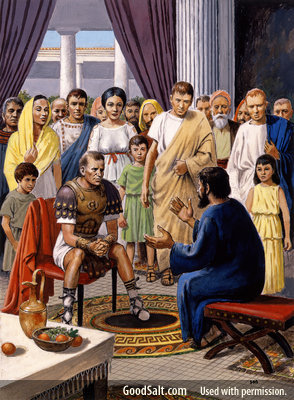 It is no coincidence that Peter was shown the vision “three times” (Verse 16) and at his door stood “three men” (we’ll discuss this more in a bit). Peter must have begun to understand this because when he arrived at Cornelius’ house, he told Cornelius:
It is no coincidence that Peter was shown the vision “three times” (Verse 16) and at his door stood “three men” (we’ll discuss this more in a bit). Peter must have begun to understand this because when he arrived at Cornelius’ house, he told Cornelius:
“… Ye know how that it is an unlawful thing for a man that is a Jew to keep company, or come unto one of another nation; but God hath shown me that I should not call any MAN common or unclean.” (Acts 10:28)
We see here that Peter understood the vision to be concerning not calling any “man” common or unclean. The vision has nothing to do with food!
I believe the creatures shown to Peter were both clean and unclean. It was the tradition of the Jewish Rabbis (not God’s Law) that clean creatures were considered unclean if come in contact with an unclean creature. So too, as we just read, it was the tradition of the Jewish Rabbis (not God’s Law) to believe that, if a Gentile associates with a Jew, a Jew then becomes unclean. The whole vision was teaching Peter (and us) to put away the old rigid ways of the added traditions and dogma concerning the racial hatred between Jews and Gentiles; especially those Gentiles who were coming into covenant with God.
Again, God is NOT telling Peter He has now cleansed all unclean creatures and they are now fit for food. This is all about the wrong belief that what God calls clean can become ritually unclean. Notice how the New English Translation explains the story of Peter and Cornelius:
"Then a voice said to him, 'Get up, Peter; slaughter and eat!' But Peter said, 'Certainly not, Lord, for I have never eaten anything defiled and ritually unclean!' The voice spoke to him again, a second time, 'What God has made clean, you must not consider ritually unclean!' ... He (Peter) said to them, 'You know that it is unlawful for a Jew to associate with or visit a Gentile, yet God has shown me that I should call no person defiled or ritually unclean.'" (Acts 10:13-15, 28)
Paul speaks of this same issue between Jew and Gentile in Ephesians 2:
“But now in Christ Jesus ye who sometimes were far off (gentiles) are made nigh by the blood of Christ. For He is our peace, who hath made both one, and hath broken down the middle wall of partition between us; Having abolished in His flesh the enmity, even the law of commandments contained in ordinances; for to make in Himself of twain (two) one new man, so making peace; And that He might reconcile both unto God in one body by the cross, having slain the enmity thereby: And came and preached peace to you which were afar off, and to them that were nigh. For through Him we both have access by one Spirit unto the Father.” (Ephesians 2:13-18)
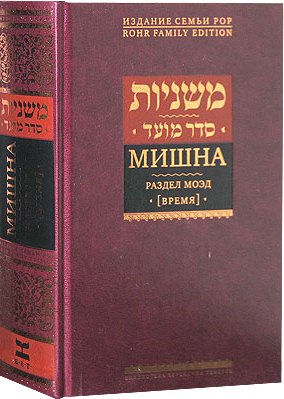 Here, the “middle wall of partition” he speaks of was the “law of commandments contained in ordinances.” These ordinances are from δόγμασιν (dogmas/ordinances/decrees) in the added oral “law of commandments” created by Jewish leaders. The man-made oral law is spoken of in the Epistle of Aristeas (139-142) and in the Jewish Mishnah (Pirkei Avot 1:1) as being a “fence” around God’s written Law. They had built this “fence” (added strict commandments) around God’s Law so the people would not even come close to disobeying the actual Law given by God. These added restrictions also caused more of a separating wall between Jews and Gentiles. It is this “wall” (fence) concerning man-made racial “dogma”, (not God’s Commands) that Jesus “tore down” bringing peace between Jew and Gentile in Him, thus making each one of us a “new man” in Christ. When Paul says that Christ would make “in Himself of twain (two) one new man” he is speaking of all mankind who chooses to unite himself with Christ.
Here, the “middle wall of partition” he speaks of was the “law of commandments contained in ordinances.” These ordinances are from δόγμασιν (dogmas/ordinances/decrees) in the added oral “law of commandments” created by Jewish leaders. The man-made oral law is spoken of in the Epistle of Aristeas (139-142) and in the Jewish Mishnah (Pirkei Avot 1:1) as being a “fence” around God’s written Law. They had built this “fence” (added strict commandments) around God’s Law so the people would not even come close to disobeying the actual Law given by God. These added restrictions also caused more of a separating wall between Jews and Gentiles. It is this “wall” (fence) concerning man-made racial “dogma”, (not God’s Commands) that Jesus “tore down” bringing peace between Jew and Gentile in Him, thus making each one of us a “new man” in Christ. When Paul says that Christ would make “in Himself of twain (two) one new man” he is speaking of all mankind who chooses to unite himself with Christ.
“For ye are all the children of God by faith in Christ Jesus. For as many of you as have been baptized into Christ have put on Christ (you have become a new man in Him). There is neither Jew nor Greek, there is neither bond nor free, there is neither male nor female: for ye are all one in Christ Jesus. And if ye be Christ's, then are ye Abraham's seed, and heirs according to the promise.” (Galatians 3:26-29)
In Acts chapter 11 Peter goes to his fellow believers in Jerusalem and recites the whole story to them explaining that the “three times” he saw the vision equates to the “three (gentile) men” who came to his door:
“And this was done three times: and all [the animals in the sheet] were drawn up again into heaven. And, behold, immediately there were three men already come unto the house where I was, sent from Caesarea unto me.” (Acts 11:10, 11)
Then in verse 18 we read:
“When they heard these things, they held their peace, and glorified God, saying, Then hath God also to the Gentiles granted repentance unto life.”
 Because of this, some believe God (in "the old covenant") had made an arbitrary distinction between clean and unclean creatures to seperate Jews from Gentiles. However, Noah (who was NOT a Jew) also knew the difference between the clean and the unclean:
Because of this, some believe God (in "the old covenant") had made an arbitrary distinction between clean and unclean creatures to seperate Jews from Gentiles. However, Noah (who was NOT a Jew) also knew the difference between the clean and the unclean:
"Of every clean beast thou shalt take to thee by sevens, the male and his female: and of the beasts that are not clean by two, the male and his female. Of fowls also of the air by sevens, the male and his female; to keep them alive upon the face of all the earth." (Genesis 7:2, 3)
No one believed Peter's vision had anything to do with God changing His dietary Law, but had everything to do with changing the preconceived mindset of fallen man, bringing us back into harmony with God’s righteousness.
God’s dietary Laws are not arbitrary restrictions, but are instructions revealing that certain things are unhealthy for us to eat because of the way we are designed. Some people call it “unclean food” but this is a misconception because “unclean creatures” were never designed as food.

